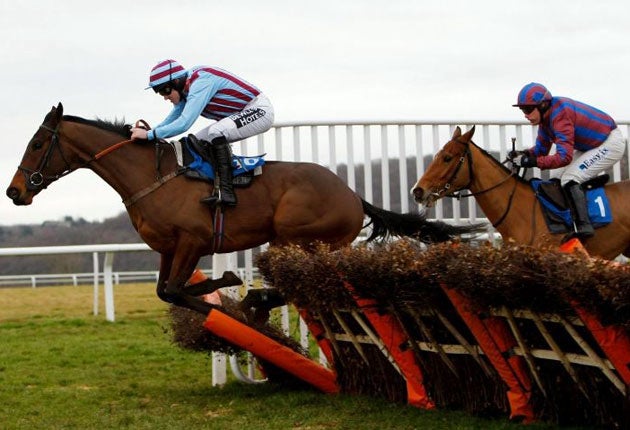Kempton in link to Kentucky

Even an environment as insular as horseracing can disclose momentous trends in the world beyond. On the face of it, the launch yesterday of the Kentucky Derby Challenge, run for the first time at Kempton on 18 March, aspired to dismantle only relatively trivial boundaries. But it was also instructive, perhaps, of an America that can turn so anxiously – whether in hope or despair – to its new president.
For the American sport echoes every extreme of the moment. Its breeding industry, for one thing, is |petrified by recession. On the track, meanwhile, its conscience remains profoundly troubled by the graphic misfortunes that shocked admirers of successive champions in Barbaro, George Washington and Eight Belles. At the same time, however, there are signs that the crisis is being addressed with the same sense of adventure that has long defined national mythology.
Last year, the Breeders’ Cup was staged on one of the new, synthetic surfaces that many view as imperative after the grotesque accident that befell Eight Belles immediately after finishing second in the Kentucky Derby. The hosts’ reward, of course, was to be unceremoniously over-run by European raiders. Vested interests would duly seem to guarantee that Churchill Downs itself will be in no hurry to dig up the dirt track, but the presence in London yesterday of its vice-president, Tom Aronson, testified to an increasing dread of complacency or introspection.
For the winner of the Kempton race will not only be guaranteed a starting berth in the 135th Kentucky Derby – an incentive that will only be properly treasured by those who know how excruciating, to Americans, is the abyss dividing the 20th horse in the ballot from the 21st. He or she will |also be offered $100,000 (£70,500) as a travel bursary.
To underestimate the significance of these gestures would be to turn the charge of parochialism this side of the water. Asked how American trainers had greeted the innovation, Aronson admitted: “I can’t say they routinely loved the idea. However the way it has been embraced is very, very positive.”
He offered, as a sample, the opinion of Kieran McLaughlin, trainer of a recent horse of the year in Invasor. |“It’s a great idea,” McLaughlin said. “Maybe I won’t feel that way if I’m on the outside looking in, with the 21st horse trying to get into the race – but that’s horseracing.” And, to Aronson, that was no platitude, but the essence of the issue. “We invite the world to race,” he said. “And we invite our own competitors to broaden their horizons as well. Everyone gains that way.”
Churchill Downs recently appointed Mark Johnson, a British commentator, to become only the sixth race caller in Kentucky Derby history. But Aronson acknowledged that fundamental differences persist between the two racing cultures, notably over the welfare hazards of racing on drugs and dirt respectively. Yet while there remains no imminent prospect of Churchill Downs introducing a synthetic surface, nor are they deaf to the debate.
“Churchill Downs also owns Arlington Park, and invested $11m replacing the dirt track there,” Aronson noted. “That was a first move in truly understanding these new surfaces. Can I foresee a time, in the future, when the Kentucky Derby is run on a synthetic track? There is no immediate consideration of that. But there is an ongoing consideration of the entire issue. I believe we have engaged in a new world, where there are three legitimate surfaces [dirt, synthetic and turf] and that can only be for the good of the horses – their trainers can refine where they can compete best, and most safely.”
For the time being, of course, the paradox persists that the Kempton winner will have established credentials of only marginal relevance to the Kentucky Derby – racing right-handed, on a different surface. But trainers are already showing earnest interest in the project. Aidan O’Brien is contemplating the race for three juvenile maiden winners (Born To Be King, Chief Lone Eagle and Great Wisdom) while John Best and Gerard Butler were present to evince characteristic audacity in their plans for Deposer and Pachattack respectively. And John Gosden, whose two Breeders’ Cup winners at Santa Anita identified the perfect ambassador for a sport without frontiers, is hoping to fit Kempton’s “far-sighted” initiative into his plans for his four Triple Crown entries.
In the meantime, all roads lead to the Cheltenham Festival. Two easy winners at Taunton yesterday, for instance, could converge in the Fred Winter Juveniles’ Handicap Hurdle. Nictory Vote, a French import, was making his debut for Paul Nicholls – who will today discuss his Festival prospects at a media open morning – while Ski Sunday became yet another horse to laugh off a penalty in the course of radical improvement for Tim Vaughan.
Join our commenting forum
Join thought-provoking conversations, follow other Independent readers and see their replies
Comments
Bookmark popover
Removed from bookmarks